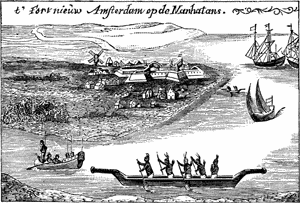
Williams left Boston and went to Salem, a more moderate settlement within the Massachusetts Bay colony. There he continued to preach and bother the elders of the Massachusetts Bay colony. Running into trouble there, he then went to the separatist settlement at Plymouth, outside the boarders of the Massachusetts Bay colony. At Plymouth, Williams denounced “hireling” ministers paid from taxes and civil oaths taken in God’s name. To earn a living, Williams took to trading English goods with the Wampanoag and Narragansett. In return for these trade goods, Williams received furs and food. In these dealings he became good friends with Massasoit, chief sachem of the Wampanoag and Cononicus, chief sachem of the Narragansett. These relationships were crucial for Williams to begin to understand the native peoples in southern New England. He learned the Narragansett language and in the process gained a great respect for the way they lived. He later used examples of their behavior as a critique of the seemingly non-Christian behavior of the English. Boast not proud English of thy birth & blood
Returning to Salem, Williams once more entered into controversy with the Massachusetts Bay authorities. He disputed English charters that took land from American Indians. He rejected civil jurisdiction over “First Table” laws (the first four of the Ten Commandments), matters of individual conscience. Several times he was warned to be quiet or face the consequences. Finally in October of 1635, Williams was charged with ‘new and dangerous opinions against the authority of the magistrates”. The charges were that:Thy brother Indian is by birth as Good. Of one blood God made Him, and Thee & All, As wise, as faire, as strong, as personall. By natures wrath’s his portion, thine no more Till grace his soule and thine in Christ restore Make sure thy second birth, else thou shalt see, Heaven ope to Indian, but shut to thee. Mr. Williams holds forth these 4 particulars:
Whereas Mr. Roger Williams, one of the elders of the church of Salem, hath broached & divulged diverse new & dangerous opinions, against the authority of magistrates, as also writt lies of defamation, both of the magistrates & churches here, & that before any conviction, & yet mainetaineth the same without retraction, it is therefore ordered, that the said Mr. Williams shall depart out of this jurisdiction within six weeks now next ensuing wch if he neglect to perform, it shall be lawful for the Govnr & two of the magistrates to send him to some place out of this jurisdiction, not to return any more without license from the Court.
Massachusetts Bay finally sentenced the troublesome minister to deportation; he fled the colony to avoid arrest. |
Last updated: September 16, 2020
